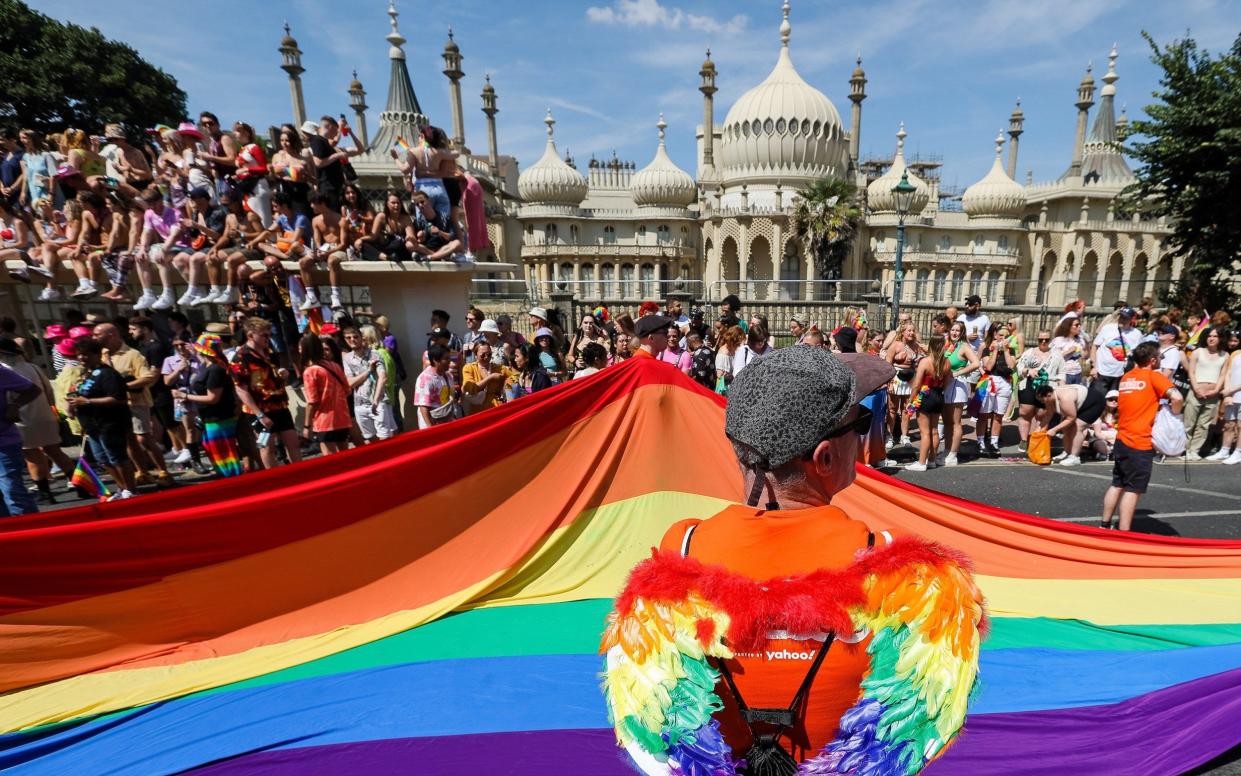Monkeypox vaccination campaign falters as Brighton runs low on jabs after Pride

Britain’s monkeypox vaccination campaign is faltering, with Brighton running low on jabs and pausing walk-in appointments a week after the city’s Pride celebrations.
Lloyd Russell-Moyle, the Labour MP for Brighton Kemptown, told the BBC that only pre-booked vaccination appointments could be honoured, with walk-ins not available because of low stock.
“My understanding is that if you are not vaccinated in the next couple of weeks then it will be too late and you’ll have to wait until September,” said Mr Russell-Moyle.
Britain ordered 100,000 more doses of the Imvanex monkeypox jab last month. They are due to be delivered in September by Bavarian Nordic, a Danish pharmaceutical firm that is the only place in the world making the vaccine.
Based on current demand, the current stockpile is likely to be completely depleted before these doses arrive.
Brighton has the second-highest number of monkeypox cases in the UK, behind London. At-risk gay men nationwide are being encouraged to come forward to get vaccinated against the condition, which leaves sufferers with painful and infectious lesions.
The virus is spreading via gay men having sex, and health officials have said there is “no robust evidence of sustained transmission” via other means.
Almost 99 per cent of the UK’s cases are in men, three-quarters are in white people, and the average age of a monkeypox patient is 36.
Health officials are encouraging all gay men who are promiscuous, have recently had an STI, or engage in group sex are eligible to get the vaccine as a preventative measure.
On Friday, the UK Health Security Agency said there was no sign of the outbreak growing, with daily cases stabilising.
Because of robust protection from the vaccine, the UKHSA prioritised first doses in order to maximise the number of people with protection.
Monkeypox variants' African labels ditched to 'avoid offending'
Variants of the virus will no longer use African labels, the World Health Organization (WHO) has ruled, in a bid to “avoid causing offence”.
Previously, the two different forms of monkeypox, known as variants or clades, were called the “Congo Basin” and the “West African” strains.
However, the WHO has on Friday ruled that this will be replaced with Roman numerals as part of a drive to minimise offence inflicted by disease names.
The current labelling system is based on where the two distinct forms of the virus circulate, with the more severe Congo Basin strain in Central Africa, and the milder West African clade found in Nigeria, to the west.
The moniker monkeypox, and the clade names, were established in 1958 before naming “best practices” were adopted. Monkeypox stuck as a name not because the virus is spread or found primarily in primates — that dubious honour belongs to rats and other rodents — but because the disease’s trademark lesions were first seen in lab-living monkeys.
Now, however, the WHO’s best practice is to give new viruses, diseases, and variants names that “avoid causing offence to any cultural, social, national, regional, professional, or ethnic groups, and minimise any negative impact on trade, travel, tourism or animal welfare”.
Congo Basin and West African strain names ditched
As a result of this, a group of pox virus experts was convened on August 8 by the WHO to “expedite agreement” among academics and accelerate the process of changing the terms.
A consensus was reached, WHO said, stating that the Congo Basin (Central African) clade will be now known as “Clade one (I)” while the former West African clade will become “Clade two (II)”.
The scientists also ruled that subvariants will be denoted by a letter following the numeral. For example, the strain currently spreading rampantly worldwide via men having sex with men will be known as Monkeypox IIb.
The new names will come into force straight away, the WHO has said, with the outdated labels to be ditched immediately.
Some academics have raised concerns about the name monkeypox, fearing it will increase stigma, and the WHO is now contemplating changing the virus’s name and is running an “open consultation” and asking for suggestions.
One proposal to rename the virus which has submitted to WHO suggests using “Mpox” instead, as monkeypox “inspires harmful ideas about black and gay people”.
Monkeypox, the proposer states, is stigmatising and inspires ridicule and indifference.
Stigma from a disease name has been shown to be harmful in the past, with Chinese and Asian people subjected to xenophobic abuse at the start of the Covid pandemic, when there was no formal name and high profile figures including President Donald Trump referred to it as the “Chinese virus” and “Kung flu”.

 Yahoo Movies
Yahoo Movies 
